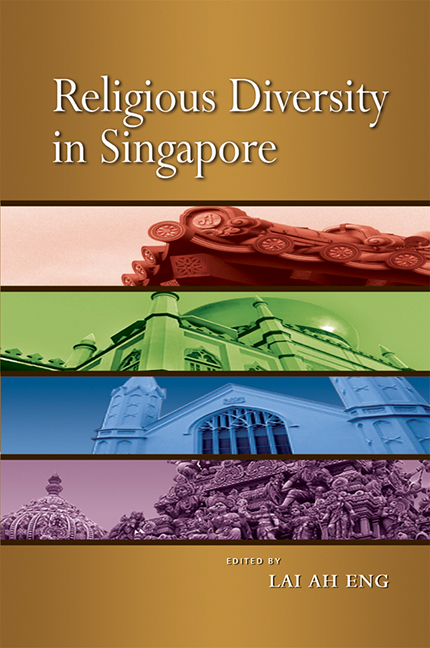Book contents
- Frontmatter
- Contents
- List of Figures and Tables
- List of Appendices
- FOREWORD
- PREFACE
- Acknowledgements
- The Contributors
- Abbreviations
- Glossary
- INTRODUCTION
- PART I The Landscape of Religious Diversity
- PART II Religion in Schools and Among the Young
- 13 From Moral Values to Citizenship Education: The Teaching of Religion in Singapore Schools
- 14 Religious Education as Locus of Curriculum: A Brief Inquiry into Madrasah Curriculum in Singapore
- 15 Mission Schools in Singapore: Religious Harmony, Social Identities, and the Negotiation of Evangelical Cultures
- 16 Religious Switching and Knowledge among Adolescents in Singapore
- PART III Religion in the Media
- PART IV Religious Organizations in Social Services
- PART V Interfaith Issues and Interaction
- Index
15 - Mission Schools in Singapore: Religious Harmony, Social Identities, and the Negotiation of Evangelical Cultures
from PART II - Religion in Schools and Among the Young
Published online by Cambridge University Press: 21 October 2015
- Frontmatter
- Contents
- List of Figures and Tables
- List of Appendices
- FOREWORD
- PREFACE
- Acknowledgements
- The Contributors
- Abbreviations
- Glossary
- INTRODUCTION
- PART I The Landscape of Religious Diversity
- PART II Religion in Schools and Among the Young
- 13 From Moral Values to Citizenship Education: The Teaching of Religion in Singapore Schools
- 14 Religious Education as Locus of Curriculum: A Brief Inquiry into Madrasah Curriculum in Singapore
- 15 Mission Schools in Singapore: Religious Harmony, Social Identities, and the Negotiation of Evangelical Cultures
- 16 Religious Switching and Knowledge among Adolescents in Singapore
- PART III Religion in the Media
- PART IV Religious Organizations in Social Services
- PART V Interfaith Issues and Interaction
- Index
Summary
INTRODUCTION
This paper briefly traces the historical role and development of mission schools in Singapore, to ascertain the means by which they achieved a reputation for excellence and maintained that reputation even after Singapore's independence and the creation of a national school system. Although mission schools have had to negotiate their distinctive character in the light of national educational imperatives and currents — including the Religious Knowledge curriculum in the 1980s and the racial-religious climate which surrounded it — the quality of a distinctive school “spirit” and its “moral” benefits have persisted throughout the history of mission schools. This, to judge from the large body of responses on the role of mission schools (ranging from ministerial comments to the responses of teachers and alumni of the schools themselves), has largely been effected through non-curricular or structural means which permit such non-curricular influences to be communicated. The result is a distinctive character of mission schools which has been broadly acknowledged to play a significant part in the Singapore educational landscape, not only or primarily in academic terms, but more in terms of the “moral” training for which mission schools are held in high regard. The superior efficacy of moral influence (which arises from the inherently Christian nature of the mission schools), over a Religious Knowledge curricular approach (in which this Christian nature has to give way to a multi-religious, pluralistic curriculum inculcated through abstract classroom dictates), argues for an enhancement of the structural leeway given to mission schools to carry out their project of Christian moral influence. Clearly, a number of safeguards have to be set in place to protect the religious sensibilities of non-Christian students. With these safeguards in place, however, the implications of the socio-historical development of mission schools in Singapore would appear to argue for a policy allowing such schools to structure an enhanced Christian influence into their modus operandi, even as schools from other religious traditions (such as the Buddhist schools) be similarly allowed to enhance their religious aspects, with an eye to the moral development of students.
- Type
- Chapter
- Information
- Religious Diversity in Singapore , pp. 362 - 380Publisher: ISEAS–Yusof Ishak InstitutePrint publication year: 2008



